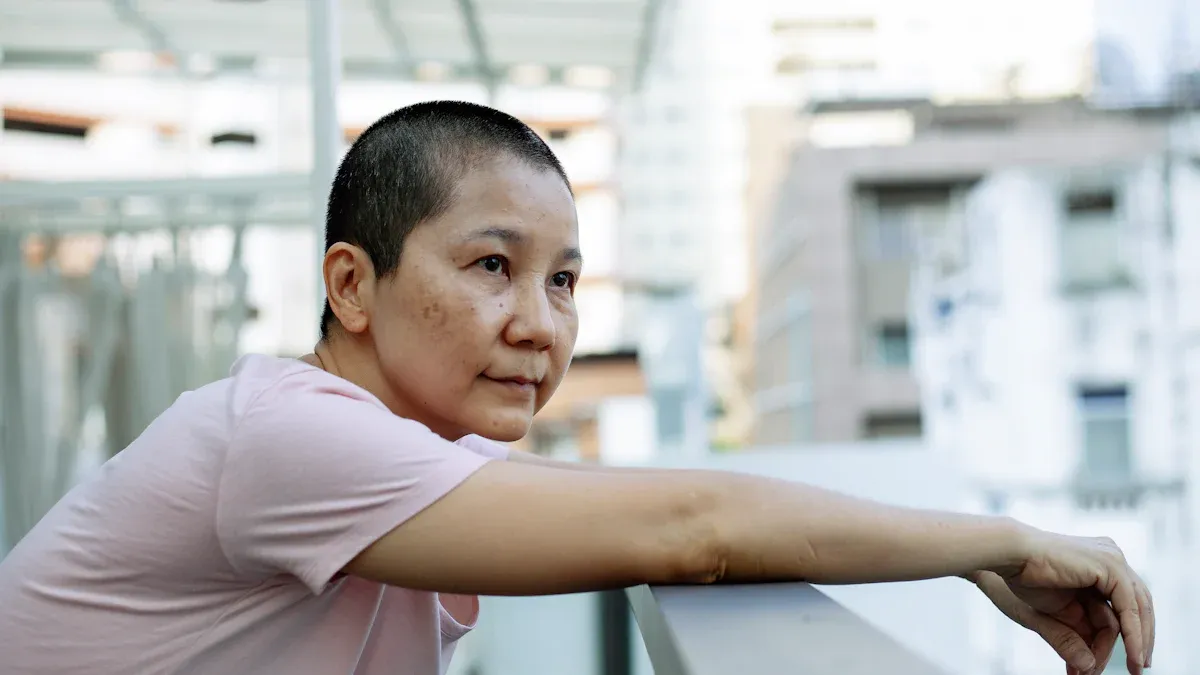Expert Tips for Coping with Cancer’s Emotional Impact

Hearing the words "you have cancer" can feel like the ground has shifted beneath you. It’s normal to feel overwhelmed, scared, or even numb. Many people experience emotional distress after a diagnosis, and studies show that younger adults often feel this more intensely due to responsibilities like work or raising children. While some may not face severe anxiety or depression, temporary distress is common and can even lead to personal growth over time.
Your emotional well-being plays a huge role in your overall health. Taking care of your mind is just as important as caring for your body. With expert advice on navigating the emotional challenges of a cancer diagnosis, you can find ways to cope and regain a sense of balance.
Key Takeaways
Accept your emotions. Feeling scared, worried, or sad is normal after learning you have cancer. Noticing these feelings helps you handle them better.
Talk openly with family and friends. Sharing your thoughts can make you feel less alone and build stronger support.
Take care of yourself. Try mindfulness, exercise, or hobbies to feel better emotionally and physically.
Join support groups or meet survivors. Talking to people who understand can bring comfort and hope.
Get professional help if needed. Therapy can teach ways to handle strong emotions and stay strong.
Understanding Emotional Challenges
Common Emotional Reactions
Fear and Uncertainty
A cancer diagnosis often brings a wave of fear and uncertainty. You might find yourself worrying about the future, treatment outcomes, or how your life will change. This is completely normal. In fact, studies show that 87.62% of newly diagnosed patients experience a fear of disease progression (FoP). It’s a natural response to the unknown, but acknowledging these feelings is the first step toward managing them.
Anxiety and Stress
Anxiety and stress can feel overwhelming, especially when you’re navigating medical appointments, treatments, and lifestyle changes. Research highlights that 75% of cancer patients report moderate distress, while 52% experience severe distress. These emotions can affect your daily life, making it harder to focus or sleep. Finding ways to calm your mind, like breathing exercises or talking to someone you trust, can make a big difference.
Depression and Sadness
Feelings of sadness or depression are also common. About 13% of cancer patients experience depression, though rates can vary depending on the type of cancer and treatment setting. For example, depression affects 3% of lung cancer patients but rises to 31% for those with digestive tract cancers. If you’re feeling persistently low, reaching out for help is crucial. You don’t have to face this alone.
Why Emotional Health Matters
Connection Between Emotional and Physical Health
Your emotional health directly impacts your physical well-being. Long-term studies show that untreated mental health issues, like anxiety or depression, can worsen physical health outcomes. Emotional recovery plays a vital role in improving your quality of life during and after treatment. Managing your emotions isn’t just about feeling better—it’s about healing better.
Long-Term Benefits of Emotional Resilience
Building emotional resilience helps you cope with challenges more effectively. It can reduce stress, improve relationships, and even enhance your response to treatment. A systematic review found that psychological interventions significantly improve the quality of life for cancer survivors, even if they don’t extend survival. Taking small steps to strengthen your emotional health today can lead to lasting benefits.

Expert Advice on Navigating the Emotional Challenges of a Cancer Diagnosis
Communication and Expression
Talking Openly with Loved Ones
Sharing your feelings with loved ones can lighten the emotional load. When you talk openly, you allow others to understand what you're going through and offer support. Studies show that expressing emotions leads to better psychological adjustment and emotional support. Suppressing feelings, on the other hand, can have negative effects. Building a trusting relationship with your healthcare team and discussing your concerns also reduces anxiety and improves your quality of life.
Guideline | Benefit |
|---|---|
Improves well-being and quality of life | |
Discuss treatment options | More likely to be content with care |
Express concerns during treatment | Reduced anxiety and other symptoms |
Communicate well with doctors | Better knowledge of the disease |
Journaling and Creative Outlets
Writing down your thoughts in a journal can help you process emotions. It’s a private space where you can express fears, hopes, or frustrations without judgment. Creative outlets like painting, music, or crafting can also provide relief. These activities allow you to channel your emotions into something meaningful, giving you a sense of control and accomplishment.
Seeking Support
Connecting with Cancer Survivors
Talking to cancer survivors can inspire hope. They’ve walked a similar path and can offer practical advice and emotional reassurance. Their stories remind you that you’re not alone and that it’s possible to navigate this journey successfully.
Practicing Self-Care
Mindfulness and Meditation
Mindfulness practices like meditation can help you stay grounded. They reduce stress by focusing your attention on the present moment. Clinical trials show that self-management techniques, including mindfulness, prevent distress from escalating into anxiety or depression. These practices empower you to manage your emotions and maintain a better quality of life.
Cognitive behavioral therapy and graded exercise therapy have also been shown to improve well-being in cancer patients, highlighting the importance of self-care routines.
Setting Boundaries and Prioritizing Rest
It’s okay to say no when you need to. Setting boundaries protects your energy and ensures you have time to rest. Prioritizing sleep and relaxation helps your body heal and keeps your mind clear. Simple acts like taking a nap or enjoying a quiet moment can make a big difference in how you feel.
Building a Support System

Role of Family and Friends
How to Ask for Help
Asking for help can feel uncomfortable, but it’s one of the most important steps you can take. Your family and friends want to support you, but they might not know how. Be specific about what you need. For example, you could ask someone to drive you to appointments or help with meal prep. A study found that cancer patients often seek companionship and empathy from loved ones, especially during treatment. Younger patients may also need help with tasks like childcare or managing the household. By clearly communicating your needs, you allow others to step in and make your journey a little easier.
Maintaining Healthy Relationships
Cancer can put a strain on relationships, but it can also bring people closer. Open communication is key. Share your feelings honestly, and encourage your loved ones to do the same. This creates a space for mutual understanding and support. Studies show that emotional support from family and friends is linked to a more positive attitude toward cancer. It’s okay to set boundaries if certain interactions feel overwhelming. Focus on nurturing relationships that uplift and energize you.
Community and Professional Networks
Finding Local Resources
Your local community can be a treasure trove of support. Many organizations offer resources like counseling, transportation, or financial assistance. Hospitals often have social workers who can connect you with these services. Community support provides emotional, instrumental, and informational help, which studies show can reduce anxiety and improve coping mechanisms. Don’t hesitate to explore what’s available in your area—you might be surprised by how much support is out there.
Effect on Emotional Well-Being | |
|---|---|
Emotional Support | Reduces anxiety and depression, instills hope |
Instrumental Support | Provides practical help, enhancing coping mechanisms |
Informational Support | Offers guidance, improving understanding of treatment |
Overall Social Support | Correlates with better quality of life and lower mortality rates |
Online Communities and Forums
If you’re looking for connection beyond your immediate circle, online communities can be a great option. These forums bring together people who truly understand what you’re going through. You can share your experiences, ask questions, or simply read others’ stories for inspiration. Research shows that strong social networks, including online ones, are linked to better mental health outcomes. Whether it’s a Facebook group or a dedicated cancer support forum, these spaces can provide comfort and encouragement whenever you need it.
Maintaining a Healthy Lifestyle

Physical Activity
Benefits of Exercise for Emotional Health
Staying active doesn’t just help your body—it’s great for your mind too. Exercise releases endorphins, often called “feel-good” hormones, which can lift your mood and reduce stress. It also improves sleep, boosts energy, and helps you feel more in control. Studies show that regular physical activity can lower anxiety and depression levels in cancer patients. Even light movement can make a big difference in how you feel emotionally.
Simple Ways to Stay Active
You don’t need to run a marathon to stay active. Start small and choose activities you enjoy. Here are a few ideas:
Take short walks around your neighborhood.
Try gentle yoga or stretching exercises.
Dance to your favorite music at home.
Use light weights or resistance bands for strength training.
Tip: Listen to your body. If you feel tired, take breaks and rest when needed. Consistency matters more than intensity.
Nutrition and Diet
Foods That Support Emotional Well-Being
What you eat can impact your mood. Foods rich in omega-3 fatty acids, like salmon or walnuts, can help reduce anxiety. Leafy greens, berries, and whole grains provide nutrients that support brain health. Don’t forget about dark chocolate—it’s a delicious way to boost your mood in moderation!
Staying Hydrated and Balanced
Drinking enough water is essential for both your body and mind. Dehydration can make you feel sluggish or irritable. Aim for at least 8 cups of water daily. Adding herbal teas or infused water with fruits can make hydration more enjoyable.
Note: Avoid skipping meals. Eating balanced portions throughout the day keeps your energy steady and helps you feel your best.
Sleep and Relaxation
Importance of Quality Sleep
Sleep is your body’s natural way of healing. It helps you recharge physically and emotionally. Poor sleep can increase stress and make it harder to cope with challenges. Aim for 7-9 hours of quality sleep each night. A consistent bedtime routine can help you fall asleep faster and wake up feeling refreshed.
Relaxation Techniques for Stress Relief
Relaxation isn’t just about sleep. Techniques like deep breathing, progressive muscle relaxation, or listening to calming music can ease tension. Try this simple breathing exercise:
Inhale deeply through your nose for 4 seconds.
Hold your breath for 4 seconds.
Exhale slowly through your mouth for 6 seconds.
Practicing this for a few minutes daily can help you feel calmer and more focused.
Seeking Professional Help
Therapy and Counseling
When to Consider Therapy
You might wonder if therapy is the right step for you. If you’re feeling overwhelmed, stuck, or unable to manage your emotions, it’s a good time to consider it. Therapy can help you process feelings of fear, sadness, or anger that often come with a cancer diagnosis. It’s also helpful if you’re struggling with sleep, relationships, or making decisions about your care. Many cancer survivors find that therapy provides a safe space to explore their emotions and develop coping strategies.
Tip: Therapy isn’t just for when you’re feeling low. It can also help you build resilience and prepare for future challenges.
Types of Therapy for Emotional Challenges
Different therapy methods can address emotional challenges in unique ways. Cognitive Behavioral Therapy (CBT) is particularly effective for reducing anxiety and depression. It focuses on changing negative thought patterns and behaviors. Psychological interventions, like psychoeducation and relaxation training, can also improve emotional well-being and quality of life.
Therapy Method | Effectiveness on Emotional Challenges | Source |
|---|---|---|
Psychological intervention | Improved quality of life | |
Cognitive Behavioral Therapy (CBT) | Reduces depression and anxiety | |
Collaborative care | Effective management of depression |
Systematic reviews show that these therapies can provide small to medium short-term benefits, helping to alleviate emotional distress and improve mental health. Long-term effects, especially in the emotional domain, highlight the importance of ongoing psychological support.
Medication and Medical Support
Managing Anxiety and Depression with Medication
Sometimes, medication can be a helpful tool for managing anxiety or depression. Antidepressants and anti-anxiety medications may be prescribed to ease severe symptoms. However, studies show mixed results regarding their effectiveness for cancer patients. Concerns about side effects and interactions with cancer treatments are common. It’s important to weigh the pros and cons with your healthcare provider.
Note: Medication is often most effective when combined with therapy or other support systems.
Working with Your Healthcare Team
Your healthcare team plays a crucial role in your emotional well-being. They can guide you toward the right resources, whether it’s therapy, or medication. Open communication is key. Share your concerns and ask questions about how emotional health fits into your treatment plan.
Emotional support can:
Reduce anxiety and depression.
Improve your understanding of medical information.
Enhance adherence to treatments.
Lead to better health outcomes and extended disease-free periods.
By working closely with your team, you can create a comprehensive plan that addresses both your physical and emotional needs. This partnership fosters resilience and helps you feel more in control of your journey.
Coping with the emotional challenges of a cancer diagnosis takes time, but you’ve got tools to help. From talking openly with loved ones to practicing mindfulness, every small step you take can make a big difference. Emotional support plays a key role in reducing anxiety and depression while boosting hope and motivation.
Key strategies include:
Using creative outlets like journaling or art.
Prioritizing rest and setting boundaries.
Key Findings | Measured Outcomes |
|---|---|
Psychological interventions improve resilience | |
Emotional support fosters empowerment | Enhanced adherence to therapies |
Remember, emotional challenges are normal and manageable. Take it one day at a time. You’re stronger than you think, and brighter days are ahead. 🌟
FAQ
What should I do if I feel overwhelmed by my emotions?
Take a moment to pause and breathe. Try grounding techniques like focusing on your senses or journaling your thoughts. Talking to someone you trust can also help. Remember, it’s okay to ask for professional support if needed.
Tip: A simple breathing exercise can calm your mind. Inhale for 4 seconds, hold for 4, and exhale for 6.
How can I explain my feelings to loved ones?
Be honest and use “I” statements to express yourself. For example, say, “I feel scared about my treatment.” This helps others understand without feeling blamed. You can also share articles or resources to help them learn about what you’re going through.
What if I don’t feel like exercising or eating healthy?
That’s okay. Start small. Take a short walk or add one healthy snack to your day. Small steps can lead to big changes over time. Listen to your body and do what feels manageable for you.
How do I know if I need therapy?
If your emotions feel too heavy to handle or interfere with daily life, therapy might help. It’s a safe space to explore your feelings and learn coping strategies. You don’t have to wait until things feel unbearable—therapy can support you at any stage.
Reminder: Seeking help is a sign of strength, not weakness. 🌟
See Also
Exploring Symptoms And Treatment Options For Choroid Plexus Carcinoma
An In-Depth Overview Of Various Cancer Types Available
Essential Information Regarding Symptoms Of Adrenocortical Carcinoma
Identifying The Symptoms Associated With Male Breast Cancer
Recognizing Symptoms And Treatment Approaches For Duodenal Cancer

